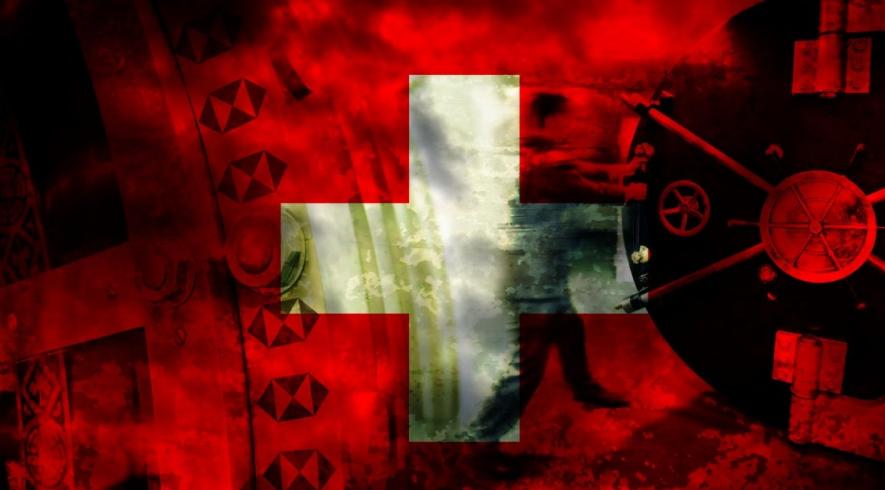Indian Deposits in Swiss Banks Increase, But it’s Just the Tip of the Iceberg

Money parked by Indians in Swiss banks rose 50 per cent to about Rs. 7000 crore in 2017 compared to previous year, according to the latest data released by Zurich-based Swiss National Bank (SNB). This reverses the downward trend in place for the last three years, as the Indian deposits have been declining since 2014.
The report comes days after a fresh installment of leaked papers from the Panamanian firm Mossack-Fonesca revealed several Indian names who had offshore accounts.
A 2017 analysis of data from the Basel based Bank of International Settlements (BIS) on bilateral foreign holdings done by Gabriel Zucman and colleagues had estimated that about Rs 4 lakh crore of Indian wealth was stashed away in offshore tax havens in 2015. Interestingly, the data revealed that Indians preferred to stash their money in Asian tax havens like Hong Kong, Macao, Singapore, Bahrain and Malaysia rather than Switzerland. While 31 per cent of the Indian wealth was kept in Switzerland, 53 per cent was held in Asian tax havens (as of 2015).
Read More: How Tax Havens Sell Secrecy
Before coming to power in 2014, a significant electoral promise made by the BJP was the recovery of billions of rupees of black money from foreign countries especially from Switzerland. The saffron party said that the money brought back will be used to deposit Rs 15 lakh in every Indian’s bank account. While the promise never took shape, the government’s inability in tackling the black money menace has become evident, as various policies implemented in the last four years for this purpose have failed.
While the Swiss report raised a storm of accusations in India that the Modi govt. had failed to check outflow of black money, the govt. was caught on the wrong foot.
Initially, finance minister Arun Jaitley (who is on leave) wrote in a social media post that it was a “shaky presumption” that all this money was tax-evaded money. Interim finance minister Piyush Goyal also reportedly said that “… how are you assuming this is black money?”
But Goyal also said, “The government is keeping a close eye. If black money is found in Swiss banks then government will take appropriate action.” He claimed that data will become available in March 2019 and then it will become clear whether this is black money or not.
Read More: The Tilted Global Scales: Tax Havens and Financial Secrecy
Many commentators asked that if the data on exact transactions and ownership was yet to come then how could the top ministers claim that it was not black money.
Speaking to Newsclick, Professor Arun Kumar of Institute of Social Sciences, opined that the money shown in SNB data includes only legitimate money declared by Indian clients and the details of the illegal money or black money are still kept unrevealed. Elaborating on how the rich stash their black money, Arun Kumar said: “Money is moved in a layering process through numerous shell companies located in tax havens mainly to hide the identity of the real beneficiary. This is one of the reasons why only hundreds of names have emerged even in leaked documents on offshore tax havens such as Swiss leaks, Panama Papers, Bahamas leaks and Paradise Papers.” He added that the actual number of Indians who have been stashing money in offshore tax havens must be in lakhs.
Furthermore, Arun Kumar said that the layering process is the reason behind why the SNB data showed less deposits from countries such as Ukraine and Russia, while British clients have highest deposits. “Of the nearly 90 tax havens across the world, numerous are located in United Kingdom’s Offshore Territories (known for their highly secretive financial centres) such as Cayman Islands, British Virgin Islands, Bermuda and so on. Because of the layering process, the real identities of the clients are kept hidden and as the shell companies are registered in these tax havens falling in UK jurisdiction, the British tax havens continue to be top-ranked jurisdiction with highest share of deposits.
Read More: Nominal or Ineffective Measures of Indian Agencies to Bring Back Black Money
In November last year, India and Switzerland have signed a joint declaration – automatic exchange of Information (AEOI) to keep a check on the black money stashed in Swiss banks. This allows both the countries to mutually collect and exchange data in accordance with the global standards from 2018-19 onwards. However, Kumar opined that this will not be sufficient to track down the black money.
Under the Prime Minister Modi’s rule, the government had called taxpayers to make declarations of their undisclosed assets (including foreign wealth) by providing compliance window at three different instances. Firstly, after the enactment of Black Money (Undisclosed Foreign Income and Assets) and Imposition of Tax Act, 2015, followed by Income Declaration Scheme (IDS) in June-September, 2016 and third time under Pradhan Mantri Garib Kalyan Yojana (PMGKY) in December 2016. Experts have asserted that all these schemes yielded little to tackle the country’s massive black economy. The demonetisation move in November 2016 was another disastrous measure by the government in the name of tackling black economy.
Get the latest reports & analysis with people's perspective on Protests, movements & deep analytical videos, discussions of the current affairs in your Telegram app. Subscribe to NewsClick's Telegram channel & get Real-Time updates on stories, as they get published on our website.
























